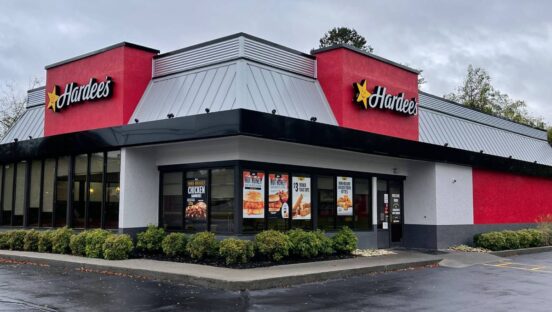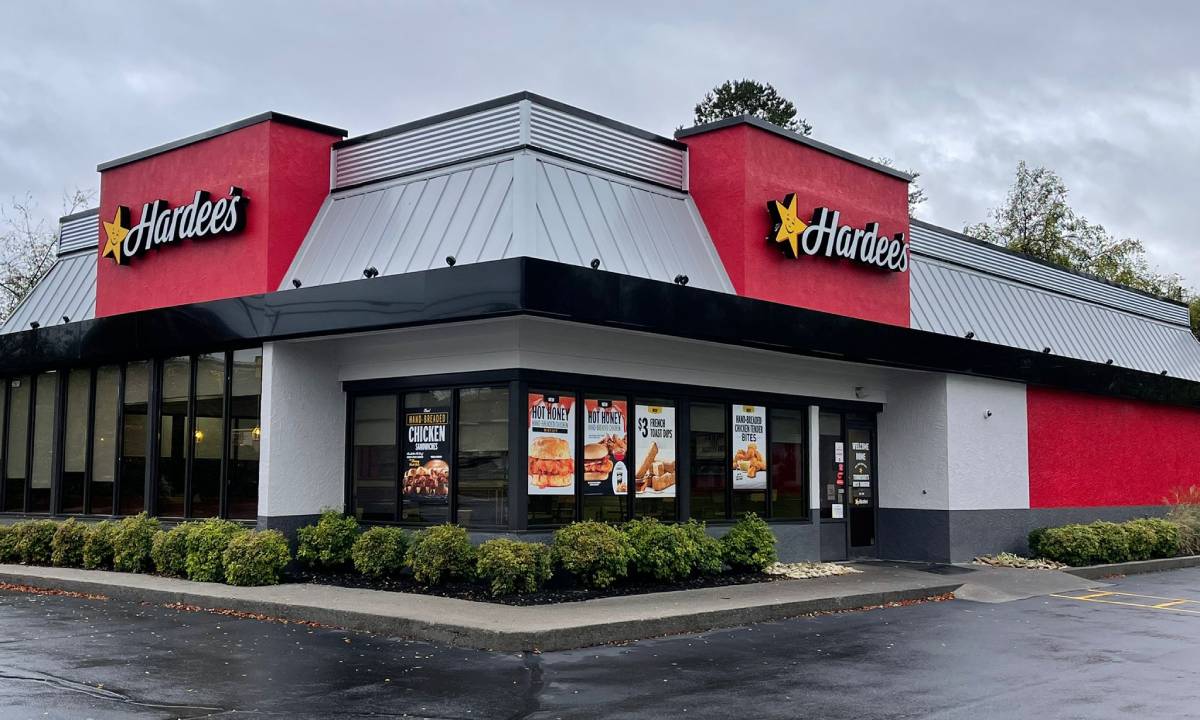Dan Mosher has held no shortage of conversations with restaurant brands over the topic of voice AI technology in recent months. And the tenor suggested heightened interest, just as it has for some time. But like any disruption, you have early adopters, and then you have those who want to see trials before buying in. Mosher, who was promoted to president of Presto Automation in late March, has a feeling Thursday’s news might help convince that latter group.
Presto announced the expansion of a partnership with CKE Restaurants, the parent company of Carl’s Jr. and Hardee’s, to roll its AI-powered solution, Presto Voice, to automate voice ordering at CKE drive-thru locations nationwide.
The deal, Mosher says, represents the largest quick-service chain to adopt voice AI thus far. Presto currently works with Checkers & Rally’s and Del Taco. CKE directs roughly 2,800 stores across 44 states.
Presto piloted the tech with CKE going back to the middle of 2022. It went live at a North Dakota franchise store and then a corporate one in Spring Hill, Tennessee, a city roughly 30 miles south of Nashville. Two more joined to make it four followed by a fifth in the Los Angeles area.
One of the lead results concerned upselling. On average, test drive-thrus achieved an 88 percent upsell offer rate to guests. Additionally, over 46 percent of the upsells offered were accepted by guests, which lifted average checks.
“Presto’s Voice AI solution is a robust choice as it aligns well with CKE’s objective of providing guests with outstanding service while simultaneously increasing operational efficiency,” Phil Crawford, CKE’s chief technology officer, said. “… the pilot program yielded positive outcomes, with deployed stores experiencing a significant rise in revenue due to the upsell capability. As a result, we are delighted to offer the Presto Voice AI technology to our franchisee base across the country.”
CKE tracked several key performance indicators with the AI, including speed of service, upsell percentage (offer rate versus take rate), combo percentage (offer rate versus take rate as well), non-intervention rate, employee and guest experience.
Using those KPIs as a barometer, CKE noted a few benefits, Crawford says. Among them:
Faster service: AI can help speed up the ordering process by accurately taking orders, reducing wait times for guests, and increasing throughput for the restaurant.
Improved order accuracy: AI showed the ability to accurately interpret customer orders, reducing errors caused by miscommunication or language barriers between guests and employees. This could lead to higher guest satisfaction and fewer order remakes.
Upselling opportunities: AI helps identify upselling opportunities by suggesting complementary items or menu upgrades based on the guests order.
Cost savings: AI can help offset or repurpose, potentially leading to cost savings for the restaurant by automating certain tasks like order taking.
Data insights: AI collects and analyzes data on customer orders, preferences, and behavior. This can provide valuable insights to optimize menu offerings, pricing, and overall guest experience.
Going back to Mosher’s original thought, AI at the drive-thru hasn’t ceded relevance of late despite external shifts in the market. Namely, while brands are finding it easier to fill positions than, say, a year ago, they’re still struggling with turnover. In turn, accuracy has been shaky as churn cuts into training. And the cost of hiring hasn’t subsided, either. Presto previously said its tech produces an average 6 percent increase in sales due to consistent upselling, and up to eight hours of labor saved per day per store.
Mosher says CKE’s staff on-hand enjoyed a better experience. Locations were able to reallocate tasks and reduce cognitive load on staff. “This is all helpful to the ongoing issues that they face as restaurant folks,” says Mosher, who served as Presto’s chief revenue officer since March 2021 before the promotion. “And the feedback for the folks we have live is very good.”
With CKE, Presto had to implement the technology for two different menus and two different POS systems. CKE’s corporate tends to use PAR Tech’s Brink and franchisees Xenial IRIS. “Being able to get this system to work consistently across multiple menus, multiple POS systems, within the same brand, was something that we bring to the table,” Mosher says. “The kind of experience with different POS systems and how to make that work and how to make it work in a voice system is very different than just even a delivery or ordering system.”
Back in March, Presto unveiled a collaboration with OpenAI to bolster its drive-thru AI voice assistant. OpenAI’s ChatGPT API expands the feature set of Presto Voice, resulting in more natural and human-line interactions. OpenAI CEO Sam Altman is actually an investor in Presto, which went public in September through a SPAC deal.
Presto Voice uses AI, including large language models and generative AI, to understand natural human language and offer logical responses to questions. The AI engine in Presto Voice integrates with the restaurant’s menu and provides support for a variety of options including item combos, coupons, price variations, and seasonal items. As more customers use the system, the AI engine becomes smarter and more context-aware—incorporating new accents, alternative terms, and unique customer queries.
Presto says more than 95 percent of its drive-thru orders taken are done so without any staff intervention.
The ChatGPT API is going to flash in three specific areas for Presto:
Enhanced Menu Options—ChatGPT will be used to create restaurant-specific and region-specific menu knowledge bases. These can then be used by Presto Voice for better restaurant data management and more powerful menu management.
Platform Robustness—ChatGPT will be used to create tens of thousands of test guest orders representing different tones, personas, and order types. This data can then be used to test Presto Voice and make it more robust by improving the stability of the AI engine.
More Natural Responses—ChatGPT will be used to make the responses to customer queries and interactions sound more natural, improving the user experience. For example, rather than saying “I have 1 burrito no guacamole, 1 burrito no tomatoes” Presto Voice could say “that’s 2 burritos, one with no guac and one with no tomatoes.”
Mosher says CKE has benefitting from some of these efforts already.
“I think the latest version, the GPT4, lends itself really well to some of the things that we’re trying to do in the drive-thru in terms of taking a response from a customer and then mixing it in using the large language models that come back,” Mosher says. “So imagine you say, can I get one burger with no tomatoes? One burger with no lettuce? And one burger with cheese? In our old model, we would have said, ‘I have, for you, one burger no tomato. One burger, no lettuce.’ But now, I can say, OK, thank you, that’s three burgers, one without lettuce, one without tomatoes, and one with cheese.”
Simply, it’s giving Presto the ability to take language and come back to the customer with something more approachable.
Although Presto has the ability to offer different versions of its voice, Mosher says the focus today is more on making sure the platform flexes to the typical needs of a drive-thru restaurant. Things like working across menus, LTO changes, and ensuring it’s being sent directly to POS and KDS stations.
But more broadly, with 340 Checkers & Rally’s on board, Del Taco’s continued expansion, and now, CKE’s decision to go big, Mosher says there’s a clear signal the approach is “coming of age.”
“This is the drumbeat of OK, now we’ve got three big companies, and every time they’re getting bigger and that’s indicative that this is a larger trend that’s on the march,” he says.
Presto’s partnership with Checkers arrived in January 2021. The system showed order accuracy of 98 percent and higher without much employee intervention during tests, far exceeding the original goal of 95 percent. Overall, Presto noted it has the most penetrated drive-thru AI in the industry, with more than 75 percent market share. The technology on average boosts upsell revenue by $330,000 per year, reduces labor costs by $35,000 annually, save five to 10 labor hours per day, and expand margins by roughly 10 percent.
For Hardee’s and Carl’s Jr., it’s a bold next step in a multi-year transformation. In May 2022, the company announced a $500 million reimaging program that focused on everything from new signage, brand statement elements, freshly installed interior and exterior digital menuboards, to upgraded lighting, bathrooms and subway tiling.
On Thursday, the company also unveiled a partnership with OpenCity’s AI proprietary voice ordering platform, “Tori” at select U.S. locations, as it works with multiple partners to layer AI into the system. These drive-thrus implemented Tori to enable customers to place their orders through a digital interaction and then pay a CKE employee at the pickup window.
Likewise, tests thus far have increased order accuracy, boosted labor efficient, productivity, and satisfaction, the company said. “Everything just runs better using Tori,” Raj Patel, a regional manager at Carl’s Jr, said in a statement. “… It used to be impossible to plan staffing with callouts every day. But, with Tori, I always feel that we’re fully staffed; and the guests are having fun using Tori to order their meals.”
Tori has become a TikTok sensation as well. Customers have frequently posted videos of their experiences on social media, yielding over 2 million views at Carl’s Jr. and Hardee’s.
In addition, CKE linked up with Valyant AI to offer its conversational AI platform in drive-thrus, making this directive a three-pronged one. Valyant’s creation, “Holly,” streamlines the customer service experience, improves employee efficiency by helping reduce customer wait times, and increases upsell opportunities at the tested restaurant locations. “As restaurant owners and franchisees continue to struggle with issues caused by the labor shortage, technological solutions like ours are critical to supporting existing staff and ensuring customer service remains a top priority,” Rob Carpenter, CEO and founder of Valyant AI, said in a statement. “We’re honored that Hardee’s and Carl’s Jr. recognize the value our technology provides and have embraced our innovative solution to unlock operational efficiencies and benefits. We believe this agreement cements Valyant AI as the leader in the field of drive-thru AI.”
Added Vicky Harrison, a general manager at Hardee’s in Russellville, Arkansas. “Not having to worry about how my guests are treated is nice. She’s always nice to customers and accommodating. My employees don’t have to worry about answering the headset and, instead, can focus on other tasks like completing orders accurately. I’m happy to have Holly in my store. It’s been a great experience.”








